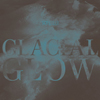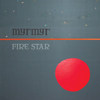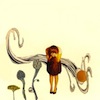- Administrator
- Albums and Singles

Sarah Lipstate has been quite a prolific and ubiquitous figure for the last few years, appearing at seemingly every important festival, touring with Emeralds and Xiu Xiu, and working with an endless parade of intriguing folks like Cold Cave, Rhys Chatham, Glenn Branca, and Carla Bozulich.  On this appropriately cool and crystalline effort, it is abundantly clear why her services are in such demand: she is simply one of most compelling experimental guitarists around.
Lipstate covers a lot of stylistic and textural ground for someone armed with only an electric guitar and some pedals, but she maintains a compositional and textural aesthetic on Glacial Glow that is distinct from most other contemporary avant guitarists.  For one, Sarah seems quite comfortable allowing her guitar to sound exactly like a guitar when it suits her.  She also has no clear aversion to straightforward chords and melodies, though that egalitarian stance noticeably misfires with her bluesy noodling in "Alone Star."  That is her sole miscalculation though: in general, her chiming arpeggios and delicately tremolo-picked shadings serve these pieces perfectly.  More significantly, Lipstate's vision is a very simple, clear, and uncluttered one.  The beauty and power of these pieces lies in the languorous flow of individual notes and the spaces between them rather in escalating density or the creation of a pleasant drone.  That is both a blessing and a curse: very little on Glacial Glow is complicated or lengthy enough to completely envelop me, but Sarah's work attains a uniquely fragile beauty and immediacy when it hits the mark and it hits the mark several times.
The album's inarguable highlight is the mesmerizing "Glacial Wave," which weaves mysterious cooing, blossoming swells, and delay-heavy cascading melodies to create something that feels a lot like gazing up at a stunning sky full of stars on a cold and lonely night.  Vestiges of that feeling hang with me to a degree throughout the entire album, which is where Glacial Glow's true power manifests itself: Lipstate maintains a constantly shifting, dreamlike reverie for the full duration of the album despite her multifarious methods and textures.  Rather than shatter the spell, pieces like the insistently throbbing "Blue" and the twinkling and laptop-fractured "Waxwing" instead serve as new chapters in an advancing narrative.  Obviously, making an otherworldly, dreamlike album is nothing new at all, but 1.) it is pretty damn rare for someone to pull it off as a solo guitarist (aside from Area C), and 2.) not all dreams are the same and I have yet to experience one with the desolate and coldly beautiful mood that Noveller evokes here.  Not everything on Glacial Glow is amazing, but the best moments certainly are and the whole thing makes for a very satisfying, thoughtful, and dynamically varied whole.
Samples:
 
Read More
- Administrator
- Albums and Singles
 Marielle Jakobsons' trajectory since her stunning solo debut as Darwinbitch in 2009 has been devoted to rather curious and specific stylistic detours, dabbling in both Indian classical music (with Date Palms) and Eastern European traditional music (on Myrmyr's The Amber Sea).  This time around, however, Marielle and Agnes Szelag eschew any overtly global/traditional nods and play things comparatively straight, delivering an alternately enchanting and disturbing suite of classical-damaged drone pieces.
Marielle Jakobsons' trajectory since her stunning solo debut as Darwinbitch in 2009 has been devoted to rather curious and specific stylistic detours, dabbling in both Indian classical music (with Date Palms) and Eastern European traditional music (on Myrmyr's The Amber Sea).  This time around, however, Marielle and Agnes Szelag eschew any overtly global/traditional nods and play things comparatively straight, delivering an alternately enchanting and disturbing suite of classical-damaged drone pieces.
The secret to a great deal of Myrmyr's beauty and uniqueness lies in their instrumentation, as Szelag (a cellist) and Jakobsons (a violinist) are both gifted multi-instrumentalists with a fondness for organic, acoustic textures.  They certainly employ electronics and processing, but the music on Fire Star very recognizably originates from strings, harps, bells, and other natural sources.  Szelag's cello is my favorite single aspect of the album, as the scrape of the bow across the strings has a gritty physicality to it that is especially powerful in the lower registers.  That said, Myrmyr's greatest gifts lie in their thoughtful arrangements and the deft interplay between textures.  The wonderful and striking opening piece, "Hot Snow Part I," is a perfect example: it begins with a pleasantly chiming and delicately plucked harp motif, but descends into darker and more emotionally resonant territory when the heavy cello drones swell into the picture.  As the piece unfolds, the melodic figure remains very crisp and distinct, while the Szelag seizes the foreground and dictates the pace and heaviness with her low-end bowing.  The right instruments are playing exactly the right parts.
The second and third parts of "Hot Snow" maintain that great momentum, delving into both beautifully layered violin-based chamber drone and something that sounds like the Yo Yo Ma songs from the Wisconsin Death Trip soundtrack being reinterpreted by The Hope Blister.  I definitely did not expect melancholy strings and clapping to complement each other so perfectly.  In fact, "Hot Snow Part III" is among my favorite songs that I have heard this year, evoking a perfectly bittersweet and autumnal sort of warmth.  That feeling does not stick around for the whole album though, a situation that would normally be disappointing, given how successful Agnes and Marielle were at nailing that particular mood.  Improbably, however, Myrmyr's late album plunge into the much darker waters of heavy, pagan-sounding psychedelic drone could not be more welcome.  I've been waiting for two long years for Jakobsons to be blackened and scary again and I could not wish for a more spectacular return to form than the swirling and groaning "Golden Ashes."
I enjoyed Myrmyr's previous album, but I viewed it more as a likable side-project than the beginning of something exciting and substantial.  Fire Star is on a completely different level in almost every respect though.  I can officially say that I am no longer pining away for another Darwinsbitch album, as it is clear that Agnes and Marielle are meant to be working together.  This is great from start to finish.
Samples:
 
Read More
- Administrator
- Albums and Singles
Ghostly International is pleased to announce the release of Work (work, work), the new LP from HTRK out September 06, 2011 in North America. After the slow burning ‘pop’ effort Marry Me Tonight from 2009, HTRK are back with Work (work, work), a similarly flat-lined study of desire and submission, this time complicated with elements of sentimentality and dysphoria. The gritty electronic sound design and simple beauty of these 10 new songs belie the sheer psychic weight to be found on this record; HTRK finished production whilst grieving the sudden loss of founding member and bassist Sean Stewart to suicide in March ‘10. Written from 2006-10 in Berlin and London, Work (work, work) has been carefully designed to offer a subtle transformative experience to those of us who seek beauty in melancholy. On Work (work, work), HTRK craft a stark soundscape: achingly slow 808 beats, eerie synth arpeggios, vaporous guitar noise, and Jonnine Standish’s androgynous, detached vocals, dripping with reverb. And yet it’s the careful way the pair combine those elements—organizing and juxtaposing them with a minimalist’s attention to detail—that makes their music so emotionally devastating. For all of Work (work, work)’s more abrasive elements, its sense of bleakness and mourning, one finds a surprisingly romantic core. A sense of doomed melancholy, a heavy heart, lives below the layers of a murky and heavy space. HTRK’s remaining members, Jonnine Standish and guitarist Nigel Yang, sweeten their heavier sonic reference points (Pan Sonic, Suicide, et al) into songs of love and lust, creating an imaginary party record for the end of time. NOTE: Mistletoe will release the album in Australia while Blast First Petite will release the album elsewhere the same week. Work (work, work) track list: 01. Ice Eyes Eis 02. Slo Glo 03. Eat Yr Heart 04. Bendin’ 05. Skinny 06. Syntheik 07. Poison 08. Work That Body 09. Love Triangle 10. Body Double
Read More
 For her fifth album, Marissa Nadler has started to let the light into her music. The reverb pedal has been left aside and her words have been put into stark relief by new instrumentation that gives her music a more country feel. This change in style has not diluted her vision; the move feels natural and sounds like it was meant to happen at some point in her career.
For her fifth album, Marissa Nadler has started to let the light into her music. The reverb pedal has been left aside and her words have been put into stark relief by new instrumentation that gives her music a more country feel. This change in style has not diluted her vision; the move feels natural and sounds like it was meant to happen at some point in her career.
- Administrator
- Albums and Singles
 For her fifth album, Marissa Nadler has started to let the light into her music. The reverb pedal has been left aside and her words have been put into stark relief by new instrumentation that gives her music a more country feel. This change in style has not diluted her vision; the move feels natural and sounds like it was meant to happen at some point in her career.
For her fifth album, Marissa Nadler has started to let the light into her music. The reverb pedal has been left aside and her words have been put into stark relief by new instrumentation that gives her music a more country feel. This change in style has not diluted her vision; the move feels natural and sounds like it was meant to happen at some point in her career.
On her first few albums, Nadler created stunning American gothic works that were as indebted to literary touchstones like Edgar Allen Poe and Shirley Jackson as they were to North American songwriters like Leonard Cohen and Neil Young. Her music had the same features of old silver halide photographs; the limited tonal range of her guitar and voice like the blacks and greys of the image and the reverb combined with her lyrics analogous to the blurs and grain of the final photographs.
Here, she retains her unique character but continues along the trajectory change she started with Little Hells to form bigger, more intricate arrangements for her songs. This is the leap from glass plates to full color film. It is this move that makes me think back to my reference to Leonard Cohen, particularly how he went from being a talented folk singer to an unmistakable force of nature. Based on the evidence here, the same might be said of Nadler. There is a vibrancy to these new songs which sound like a new world compared to her early albums.
Such a sea change could spell disaster for such an artist with such a strong aesthetic but Nadler is confident and talented enough to make it work. The pedal steel guitar and piano on "The Sun Always Reminds Me of You" brings the heat of a Nashville summer into the music. The bittersweet lyrics place Nadler closer to the likes of Josh Pearson than to the likes of Joanna Newsom and Devendra Banhart where she is usually classed. This is true of the rest of the album as Nadler takes on a more mature, classic songwriting style without sacrificing any of her bite. Elsewhere, a whining synthesizer on "Baby I Will Leave You in the Morning" pushes the music again away from any sort of "safe" country that these arrangements might stray towards.
Lyrically, Nadler has not strayed too far from what I have come to expect from her, which is a good thing indeed. Mixing folklore with myth, myth with romance and romance with existential woe, there is a lot going on even within one song. Lines like "With my phantom limbs and eerie hymns/There are two of us here that I know" show that her turn of phrase still revolves around the dusty romanticism of the kind of Americana that exists only in poetry, music and film.
While I think her Songs III: Bird on the Water remains her definitive album, Nadler is setting on a path which will result in some exceptionally rewarding music. This album is great but the potential to be even greater is not only there but blooming. In later years, Little Hells and Marissa Nadler will probably be viewed as a transitional period for Nadler but in the present, this is another exceptional album that begs attention
samples:
 
Read More
- Administrator
- Albums and Singles
 For their fourth album, Michael Begg and Deryk Thomas continue the development they began on 2009’s Black Hill album; deeply nocturnal, mournful and staggeringly beautiful music which takes in everything from the slow decay of time to post-colonial regret. This is undoubtedly their most superbly made and personal album to date.
For their fourth album, Michael Begg and Deryk Thomas continue the development they began on 2009’s Black Hill album; deeply nocturnal, mournful and staggeringly beautiful music which takes in everything from the slow decay of time to post-colonial regret. This is undoubtedly their most superbly made and personal album to date.
The album begins with a black, velvet envelope of treated piano. Melancholy but not maudlin, the music is powerfully nostalgic as Begg and Thomas try to get into the mind of a sleeping pharaoh in the British Museum who is longing for his lost resting place. Lulled into a relaxed, thoughtful repose, I nearly jumped out of my skin when the slow, steady percussion of "Fortress Longing" breaks through the music like that feeling of falling in your sleep breaks through a dream. There are shades of Bohren & Der Club of Gore’s experiments in mood in the slinky bass motif but Human Greed have become so utterly dreamlike that the comparison is only superficial.
Voices emerge through the deep, gorgeous webs of sound as men, women and children intone: "Where is my blanket of sand?" Each time, the poignancy of these thoughts comes through strong. Plucked from their tombs by European and American archaeologists, what was meant to be an eternal rest became an eternal sideshow in museums far from home. On a more immediate level, here are priceless pieces of history taken from the people whose history these ancients were part of. One such piece of history, a gold pendant of two bees made by the Minoans on display in Heraklion, Crete. The Minoans were one of the first to domesticate bees for honey and, in Egypt, bees were symbolic of the nation and the pharaoh. Capturing this complex mixture of feelings, Begg’s colleague from Fovea Hex, Laura Sheeran, orchestrates a sublime vocal interlude on "Weeping Bees of Heraklion" which has the same lilting buzz of what I imagine these sad Minoan bees to sound like.
The limited edition of Fortress Longing comes with a bonus disc containing Colin Potter’s reconstruction of the raw materials. Like Potter’s work with Fovea Hex’s recent album, he demonstrates an insightful and unexpected perspective on the music and creates "Deshret" which equals the work Begg and Thomas put into the "rea" album. Long and elaborate tones, just about recognisable from Begg and Thomas’ originals, make up the bulk of the piece before resolving into Julia Kent’s cello playing.
I cannot help but be taken aback by how carefully composed and charged Fortress Longing is. Begg and Thomas have definitely gone beyond their previous benchmarks to create one of the albums of the year. This is a deep, multifaceted recording that comes together far better and far stronger than even their best work before this (and I admire the first three albums a lot). It is not simply a soundtrack to the sense of loss of history to shelves and storage cupboards but also a reflection on our own time on earth and what will become of us after death. The final message of Fortress Longing is to make a mark now and let it make its way into the eternity you cannot achieve.
samples:
 
Read More
- Administrator
- Albums and Singles
 Recorded live on a boat in 2008, this CD documents the first performance of Comus in over 30 years. Evidently whatever pact they made to make First Utterance had a retirement clause in it as the band sounds remarkably potent here. Had this been an archive recording from their creative zenith, I would have been impressed but bearing in mind this is the first time they had taken a stage together in over 30 years, this is phenomenal.
Recorded live on a boat in 2008, this CD documents the first performance of Comus in over 30 years. Evidently whatever pact they made to make First Utterance had a retirement clause in it as the band sounds remarkably potent here. Had this been an archive recording from their creative zenith, I would have been impressed but bearing in mind this is the first time they had taken a stage together in over 30 years, this is phenomenal.
Playing at the request of Opeth’s Mikael Åkerfeldt (a massive fan of Comus to the point of naming their fantastic 1998 album My Arms, Your Hearse after Comus lyrics), the group made their way out to a metal festival based on a cruise ship setting sail from Stockholm where they received a rapturous reception based on the sounds of this recording. This set was originally issued as a DVD a couple of years ago and while this CD covers the exact same material, it is nice to have this music in a format that is more user friendly (I am not one for sitting down with music DVDs very often).
Opening with a powerful version of "Song to Comus," it is difficultto be anything other than blown away by the primal, sexual force of the music. Roger Wootton’s voice sounds as demonic here as it did on First Utterance and he sounds like the feral forest entity Comus in human form. The Bacchanalian frenzy continues with "Diana" which sees Colin Pearson’s violin cutting through the music like the baying hounds through the undergrowth chasing the song’s namesake. As good as this is, the highlight of East of Sweden is undoubtedly "Drip Drip" (incidentally my favorite song from First Utterance). Violent, murderous and exquisitely played, this is the perfect example of why Comus were such an important and thrilling band. Importantly, it shows that they still have the potential to stir up the same feelings and excitement in listeners today.
While there are no new Comus songs on the album, they do include a cover of The Velvet Underground’s "Venus in Furs" at the end of their set. It does not have the same sheer power of the original but no VU cover has ever really managed to surpass the originals. Yet, it fits better with the material from First Utterance than Comus’ own second album. The CD finishes with the encore: another rendition of "Song to Comus," which riles the crowd up as it did at the beginning of the concert. It says an awful lot that an artist can play the same song twice and come out of it sounding like heroes. Granted they are violating and frightening heroes but heroes nonetheless.
The lack of any new material on the album is significant. Their second album was a middling-to-good attempt were it another band but compared to First Utterence it was a disappointment. I have seen Comus since this live album was recorded and they included new material that I found to be mixed. However, East of Sweden is still a ferocious and essential recording that is as good to my ears as First Utterence despite my concerns about Comus’ future.
samples:
 
Read More
- Administrator
- Albums and Singles
 Obsessively edited and finalized over the past four years, this new side project of Whitehouse's William Bennett has certainly had its share of pre-release hype, and thankfully it exceeds the expectations I had for it. While there are a few similarities to his other work, there are also a great deal of differences to be heard, making it a distinctly different project.
Obsessively edited and finalized over the past four years, this new side project of Whitehouse's William Bennett has certainly had its share of pre-release hype, and thankfully it exceeds the expectations I had for it. While there are a few similarities to his other work, there are also a great deal of differences to be heard, making it a distinctly different project.
Susan Lawly/Very Friendly
For those who haven't been following its creation, Cut Hands is Bennett’s exploration of traditional African percussion instruments, along with a tasteful amount of processing and synthesizer accents.It might seem like a shocking shift, but it’s not.While Whitehouse have often been unfairly pigeon-holed as just a noise band with sexually explicit vocals, they definitely evolved into something much more complex and varied.
Bennett's interest in African percussion first found its way onto Whitehouse's Bird Seed album as "Munkisi Munkondi," which also appears here.The track still feels more indebted to noise rather than African percussion, but it was the clear start of this project.Actually, if rumors are true, Bennett himself is solely responsible for the Extreme Music from Africa compilation from 1997, putting the roots of Cut Hands all the way back then.
For better or worse, the African inspired tracks from the last three Whitehouse albums are included here, the aforementioned "Munkisi Mukondi," "Nzambi Ia Lufua" from Asceticists 2006, and "Bia Mintatu" from Racket.They stand out as a bit harsher in comparison to the new material, and they’re also already familiar to Whitehouse fans, but it makes sense to include them here in this context.
This new material might not have the same brutality as Bennett's other work, but it lacks none of the intensity.The complex polyrhythms of "Stabbers Conspiracy," for example, clatter with the rapid intensity of a gang of Somali warlords firing their black market AK-47s.Elsewhere, "Shut Up and Bleed" takes the same rapid fire percussion approach, but with the addition of raw and painful synth noise that is as abrasive as any of his other work.
The strongest pieces are actually, in my opinion, the more spacious, ambient ones.There's a certain cinematic drama conveyed in them, fitting considering some of these tracks appearing in a few documentaries previously."Rain Washes Over Chaff" and its drumless reprise "Rain Washes Over Every Thing" utilize clipped synth swells and brass instruments to mimic the animal sounds of the jungle, creating exceptional tension throughout. "++++ (Four Crosses)" also drops the percussion entirely, using the digitally processed sound from the last few Whitehouse albums to create a shimmering, melancholy ambient piece that is actually quite beautiful.
Interestingly enough, some of the more mid-paced pieces, like "Impassion" could almost pass on a general "world music" compilation, not doing anything overtly abrasive or aggressive.Thankfully these moments are few and far between:too much of this would, to me, make this into a generic third world exploitation piece.Songs like they heavily layered "Ezili Freda" are the polar opposite, burying the percussion under layers of complex noise.
Too often when I hear "world music," I think either generic coffee shop ambience, indie kids trying to look hip ("I only listen to music from countries where they don't have electricity!"), or exploiting other cultures for the sake of appearing unique.Cut Hands has none of that.Not once did I feel like Bennett was trying to co-op African culture as his own, nor does it feel like any cry for attention by being "different."It simply sounds like an artist exploring a topic he is genuinely interested in out of pure love and fascination, with the result being captivating and unique.
samples:
 
Read More
- Creaig Dunton
- Albums and Singles

From its opening gated reverb drums and spacious guitars, it's clear that this Ohio band’s debut is wearing its early '80s post-punk roots on its sleeve. While it's hard to totally gauge the band on this short record, anyone who likes the era would probably welcome giving this a spin.
"Nature of Feeling," the aforementioned opening track, adds in a healthy dose of melodic bass and oddly performed vocals that are somewhat reminiscent of Missing Persons, but even that's reaching somewhat.They're hard to describe, to say the least.
The overall sound is consistent through all six songs on this EP, with some variations on the theme."Morning in a Room" nicely pairs dirgy, grungy bass with some almost surf influenced guitar, making it overall pretty vibrant in comparison to the darker songs around it.
Same goes for "Future Fights," a short, spiky tune that rushes through its minute and a half duration.Both "Suits" and "Passage on a Ghost Ship" are, comparatively, far more complex, with evolving structures and terse, shifting guitar melodies.I can't help but smile at the rolling tom drums of "Animal Heart," which could totally be stolen from New Order's Movement.
There's definitely a "lost band from the '80s" feel to this EP, and it covers all the bases of the era I like to hear.The vocals are definitely an acquired taste, one I'm still working on.Haley Morris' bass vocals are quite distinct and probably the most idiosyncratic and defining characteristic of the band.They're odd, but still work within the context of the record.It's hard to totally pin down Pleasure Leftists based on this relatively brief EP, but my interest is definitely piqued.
Read More
 Recorded live on a boat in 2008, this CD documents the first performance of Comus in over 30 years. Evidently whatever pact they made to make First Utterance had a retirement clause in it as the band sounds remarkably potent here. Had this been an archive recording from their creative zenith, I would have been impressed but bearing in mind this is the first time they had taken a stage together in over 30 years, this is phenomenal.
Recorded live on a boat in 2008, this CD documents the first performance of Comus in over 30 years. Evidently whatever pact they made to make First Utterance had a retirement clause in it as the band sounds remarkably potent here. Had this been an archive recording from their creative zenith, I would have been impressed but bearing in mind this is the first time they had taken a stage together in over 30 years, this is phenomenal.
- Administrator
- Albums and Singles
 Acid Mothers Temple have had their spot on Hawkwind's vacant space-rock throne pretty much locked down for years, but it increasingly looks like they are going to have to share it with White Hills.  This double album is an explosive and oft-angry monolith of hard rockin', in-the-red psych rock excess that is alternately exhausting and exhilarating.
Acid Mothers Temple have had their spot on Hawkwind's vacant space-rock throne pretty much locked down for years, but it increasingly looks like they are going to have to share it with White Hills.  This double album is an explosive and oft-angry monolith of hard rockin', in-the-red psych rock excess that is alternately exhausting and exhilarating.
White Hills do one thing better than almost anyone else: bludgeoningly repetitive, volcanic guitar freak-outs.  In fact, H-p1 opens with one ("The Condition of Nothing") and it is pretty face-melting.  The problem is that the success or failure of that type of song is almost entirely dependent on how much I like the main riff and they do not always nail it.  Another serious problem is that White Hills cannot just keep churning out variations of that same song indefinitely.  They admittedly have a few other tricks up their sleeves, but not quite enough to sustain the momentum necessary to make an 80-minute album compelling from start to finish.
Naturally, the "bad-ass riff plus wild Dave W. shredding" songs like the title piece and "Upon Arrival" largely steal the show.  They are exactly what I enjoy and expect from White Hills.  I don't know if I would describe Dave as a genius or a virtuoso, but he definitely hits all the right spots as far as frenzied wah-wah-heavy guitar squalls are concerned.  He excels at what he does, but what he does is very specific.  Fortunately, there are a few very likable divergences amidst these 9 songs as well.  The biggest surprise is probably "Paradise," a killer white noise-heavy motorik work-out featuring guest drumming from Oneida's Kid Millions.  There are also a few space-y synth-based soundscapes centered around special guest Shazzula Nebula, which is definitely a step in the right direction sequencing-wise.  I enjoyed the oscillating interstellar loneliness of "A Need to Know" quite a bit, but the sheer fact that the band's crushing onslaught is now broken up a bit by oases of relative calm is far more important than the actual content of the guitarless pieces.  The new textures, contrasts, and melodic passages make a huge difference in enhancing the listenability of the album and heightening the impact of the heavy parts.
While there were a few meandering  and less-than-compelling pieces like "Monument"(basically just a drum solo with some bleeps and whooshes over it), this is generally a pretty solid batch of songs.  H-p1's main issue is that there is simply too much material to digest in one dose–this album is overwhelming.  That problem is confounded by the fact that Dave's vocals are almost always of the urgent/angry/howling variety, which can get a bit tiring.  I understand that the band's anti-corporate/consumerist message lends itself to that sort of delivery, but I definitely welcomed the more laid-back, chant-like vocals in "The Condition of Nothing" as well the songs that had no singing at all.  It is not that he is a bad vocalist, but he is a pretty one-dimensional one.  Despite those caveats, however, White Hills is very powerful musical entity; it's just that they are one that is still best appreciated in smaller doses at this point in their career.
Samples:
 
Read More


